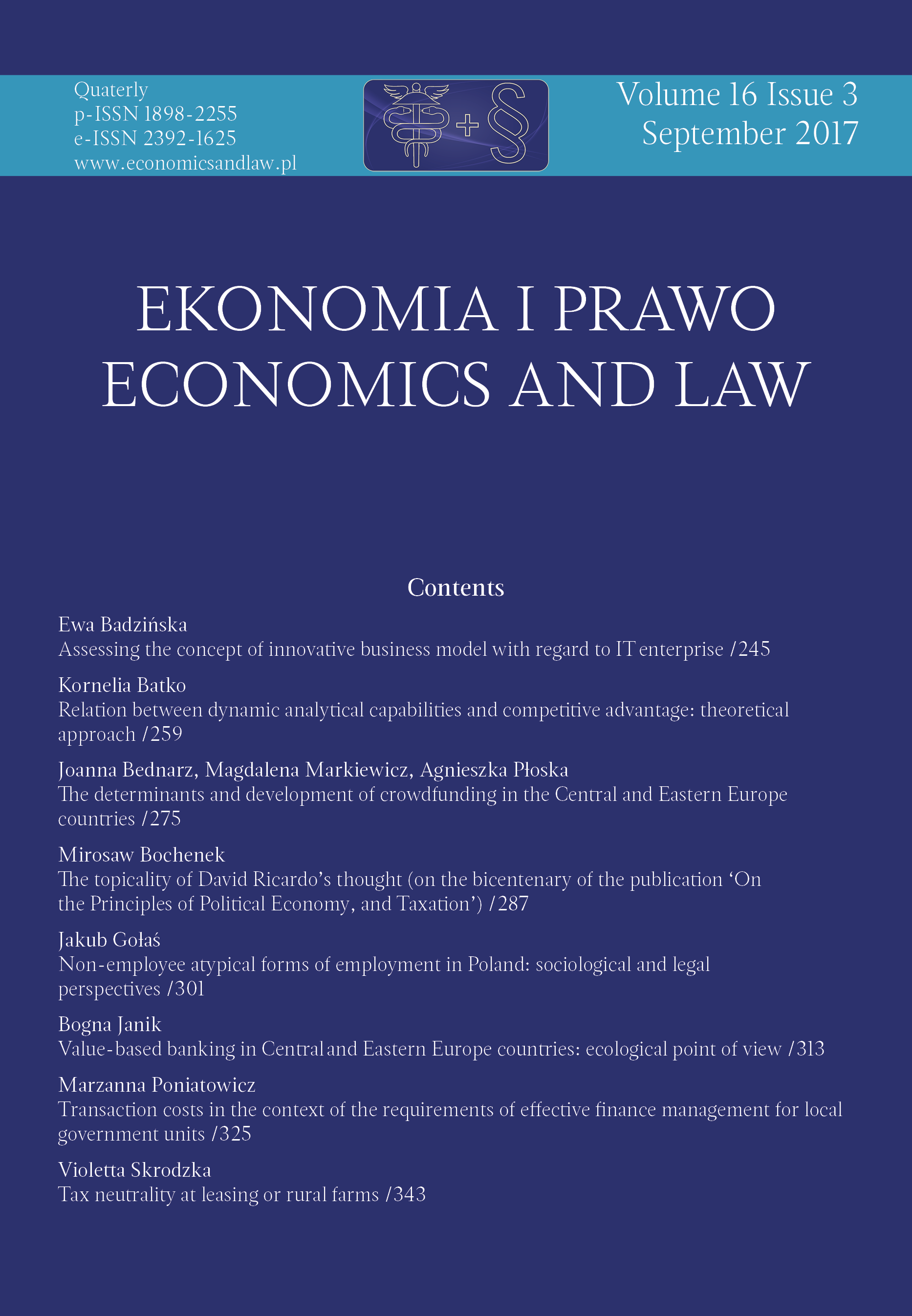Value-based banking in Central and Eastern Europe countries: ecological point of view
DOI:
https://doi.org/10.12775/EiP.2017.022Keywords
environmental care, social banking, sustainable indices, value-based bankingAbstract
Motivation: Banks play an important role connected with financing pro-ecological investments made by enterprises. They support pro-ecological activities of the entities applying for financing or offer saving/investment products relating to the environmental impact. In terms of their external pro-ecological activities there can be distinguished two groups of banks. The first group offers a wide selection of products and pro-ecological services as well as uses the tools of environmental risk management. The second group concentrates on offering selective products and services as well as is.
Aim: The main objective of the study is to identify and assess some chosen aspects of ecological activities of the banks listed on Stock Exchanges in CEE countries and included in sectoral indices and sustainable indices such as: RESPECT, CEERIUS and VONIX. The scope of this analysis encompasses selected dimensions illustrating banks’ activities in terms of environmental protection. The analysis of the investigated dilemma was based mainly on the desk research of digital and documentary sources.
Results: The results indicate relatively huge differences across environmental care in value-based banks compared to conventional banks, and small differences between value-based banks.
References
Cooper, R.G., Easingwood, C.J., Edgett, S., Kleinschmidt, E.J., & Storey, C. (1994). What distinguishes the top performing new products in financial servicies. Journal of Product Innovation Management, 11(4). doi:10.1111/1540-5885.1140281.
De Clerck, F. (2009). Ethical banking. In L. Zsolnai, Z. Boda, & L. Fekete (Eds.), Ethical prospects: economy, society, and environment. Berlin–Heidelberg–New York: Springer. doi:10.1007/978-1-4020-9821-5_10.
Dowell, G., Hart, S., & Yeung, B. (2000). Do corporate global environmental standards create or destroy market value? Management Science, 46(8). doi:10.1287/mnsc.46.8.1059.12030.
Edgett, S., & Parkinson, S. (1994). The development of new financial services: identi-fying determinants of success and failure. International Journal of Service Industry Management, 5(4). doi:10.1108/09564239410068689.
Janik, B., Kołodziejczyk, K., (2016). Ecological and eco-innovative activities of the banks. Perspectives of Innovations, Economics and Business, 16(1). doi:10.15208/pieb.2016.02.
Jeucken, M. (2004). Sustainability in finance: banking on the planet. Delft: Eburon Academic Publishers.
Klassen, R., McLaughlin, C. (1996). The impact of environmental management on firm performance. Management Science, 42(8). doi:10.1287/mnsc.42.8.1199.
McMillan, I., McCaffery, M.L., & Van Wijk, G. (1985). Competitor’s response to easily imitated new products: exploring commercial banking product introductions. Stra-tegic Management Journal, 6(1). doi:10.1002/smj.4250060106.
Milano, R. (2011). Social banking. In O. Weber, & S. Remer (Eds.), Social banking and the future of sustainable finance. London–New York: Routledge, Taylor & Francis Group. doi:10.4324/9780203827871.
Murphy, J., & Gouldson, A. (2000). Environmental policy and industrial innovation: integrating environment and economy through ecological modernization. Geofo-rum, 31(1). doi:10.1016/s0016-7185(99)00042-1.
Scheire, C., & de Maertelaere, S. (2009). Banking to make a difference (Preliminary Report), Artevelde: Artevelde University College.
Thwaites, D. (1992). Organizational influences on the new product development pro-cess in financial services. Journal of Product Innovation Management, 9(4). doi:10.1111/1540-5885.940303.
Vermeulen, P.A.M. (2001). Organizing product innovation in financial services. Nij-megan: Nijmegen University Press.
Weber, O., & Remer, S. (2011). Social banking: introduction. In O. Weber, & S. Remer (Eds.), Social banking and the future of sustainable finance. London–New York: Routledge, Taylor & Francis Group. doi:10.4324/9780203827871.
Downloads
Published
How to Cite
Issue
Section
Stats
Number of views and downloads: 494
Number of citations: 0
